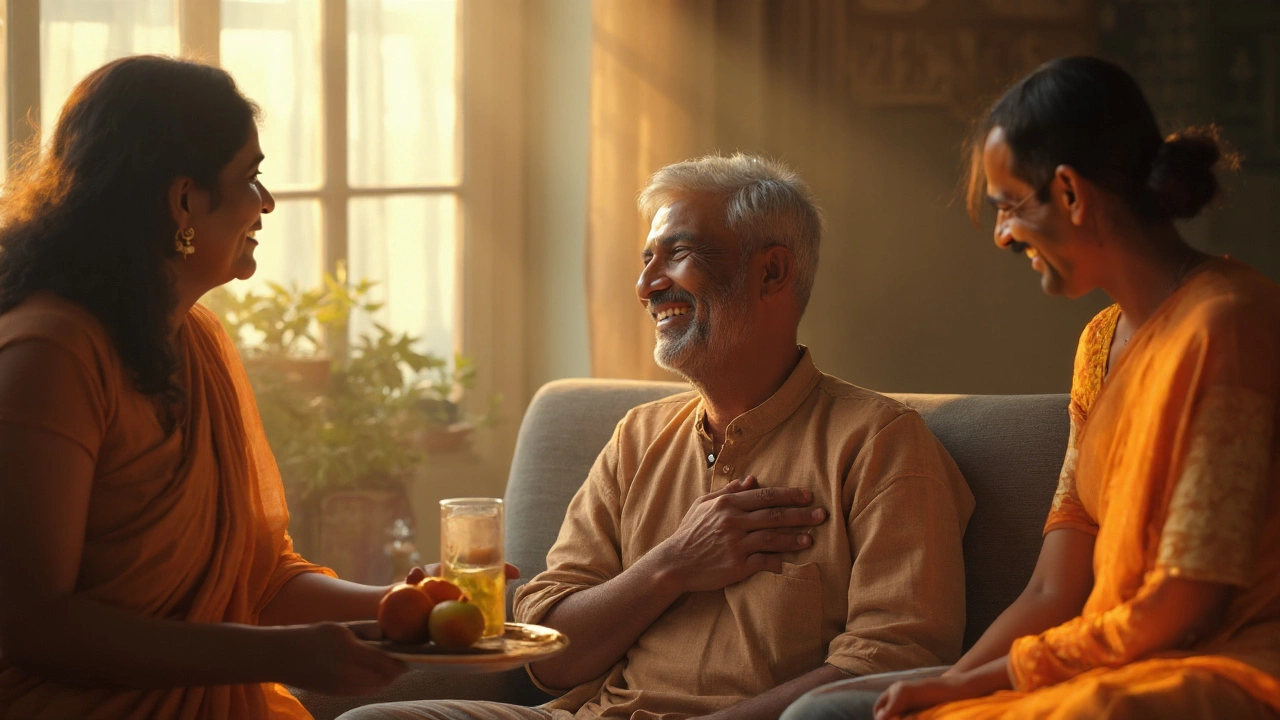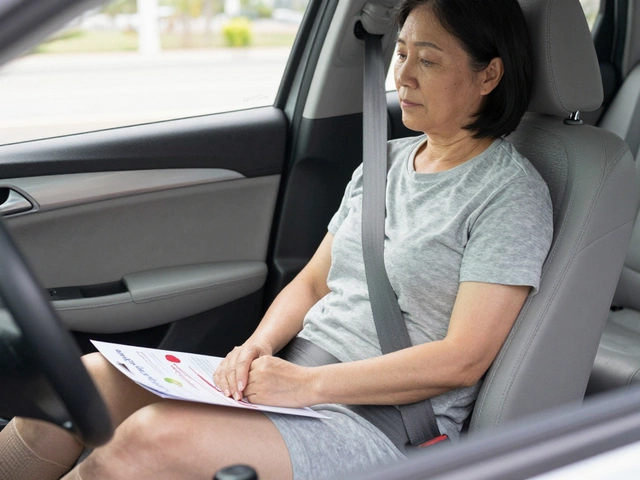If you think a scalpel and a few stitches could keep folks down for long, think again. People bounce back from heart surgery in ways that surprise even their doctors. But, that first week post-surgery? It’s rough. I remember a friend, Sameer, telling me how it felt like a tractor drove over his chest. He joked about his "zipper" scar at the hospital, but nobody laughs when you’re waking up at 2 a.m., gasping for air, or feeling a strange ache with every little cough. You walk slower, you think about your heartbeat every minute, and every distant sneeze sounds like trouble. Yet, for most, what hits hardest isn’t the pain—it’s the anxiety. What does life look like now? Can I walk my dog again? Will my kids look at me differently? Is there going to be a day when my heart doesn’t feel fragile like a cracked vase?
Physical Recovery: The Road from Hospital Bed to Living Room Couch
Don’t let anyone tell you heart surgery recovery is a straight line. One day you’re up, the next you feel like you got steamrolled. First fact: most people go home from the hospital in less than a week if there are no complications. The average ICU stay is just two or three days for cardiac surgery. The thing is, lying in that hospital bed, even for a few days, makes your body lose its mojo. Simple acts—standing, getting to the bathroom, even shifting in bed—feel difficult at first. You’re sent home with a laundry list of dos and don’ts: don’t lift more than a kilo, don’t drive, don’t climb stairs too quickly, don’t forget your meds, don’t ignore your new chest scar. Did I mention the chest pillow? Hugging it makes getting up bearable, especially when you have to cough or sneeze.
Strangely, the biggest early hurdle isn’t the heart—it’s the muscles. You lose muscle power just lying in bed. Walking turns into your best friend: you start with ten or fifteen meters, then you push for more each day. There’s actual research that shows people who start very light exercise and movement within a week have shorter recovery overall and better long-term outcomes. Still, nobody expects you to do a marathon. Listen to your body. Wrangling my daughter Sanjana to school used to be a sprint—now it’s a careful stroll, at least for the first month after surgery. The medical team usually sets out a cardiac rehabilitation plan. That’s medical-speak for a structured program, often about 12 weeks, focused on safe movement, breathing exercises, and regaining strength. If you stick to it, most people are back to light work and daily chores—like grocery shopping—within 6 to 10 weeks. Some folks, usually the younger ones or those who kept active, amaze everyone by getting back on a bicycle within two months. Not where you imagined yourself after getting your chest sawed open, right?
The warning signs during recovery are nothing to play with. Swelling in your feet, sudden weight gain, fever, chest pain, or a racing heartbeat means it’s time to call your doctor. My friend’s uncle had a tiny wound infection that ballooned into a big problem because he thought it would “just heal.” Cardiac care teams hammer home the importance of wound care—wash gently, keep the scar dry, and avoid picking at any scabs. Another thing nobody tells you: you might experience weird nerve pain or numbness near the incision for months, sometimes even a year. It's common, usually fades, but it freaks people out.
Medication becomes your new normal. Blood thinners, beta-blockers, statins—they’re now in your toiletry kit, right next to the toothbrush and shaving cream. You won’t “feel different” from the pills immediately, but skipping a day is a gamble most won’t take after living through heart surgery. Setting alarms helps, especially when brain fog from anesthesia is still wearing off. Some days you wake up and question if you’ll ever feel like your old self. Guess what? Over 95% of major heart surgery patients in a 2022 study reported their energy and activity improved within six months. Feels slow at first, but it’s real.
The Emotional Rollercoaster: Tackling Anxiety, Relationships, and Your Changing Identity
Honestly, the physical pain fades way sooner than the emotional toll. For a lot of people, life after heart surgery triggers a kind of identity crisis. Who am I now? Am I the same dad or mom, partner, or boss that I was before? Will I always be “fragile” in everyone’s eyes? People tiptoe around, avoiding heated arguments or asking you to do anything strenuous. For me, after seeing what my uncle went through, I realized the biggest hurdle was fear. Nightmares about the surgery, flashbacks to the ICU beeps, sudden rushes of panic if his heart skipped a beat. It’s not rare—studies peg the rate of mild depression or anxiety around 30% just after cardiac surgery.
Your spouse or partner will be affected, too. Mira went through every possible mood swing—at first, she worried I wouldn’t get better, then she got annoyed because she had to shoulder more chores. Sharing how you feel can be hard, especially if “strong and silent” has always been your thing. But talking helps. I’ve sat at parks with others who’ve had bypass surgery and, trust me, nobody else truly gets those weird new fears except fellow survivors. Support groups, whether online or at hospitals, are gold. Sometimes you just need someone to roll their eyes with you about the taste of hospital food or the mountains of pills.
Relationships can get complicated. Suddenly, adult children like Aditya want to know where you’re going, what you’re eating, if you walked “too much” today. You lose a little independence at first. Accepting help is tough—but you realize it’s temporary. And it’s a chance to teach your family about the importance of recovery, communication, and healthy living. At the end of three months, most families settle into a new normal. People tease you again, you share chores (maybe with some limits), and slowly the shadow of surgery shrinks. Some guys I know have discovered new hobbies—gardening, slow cycling, board games—that bring everyone together. That’s an unexpected plus.
Returning to work brings another set of emotional doubts. Can I handle the stress? Is my brain as sharp after anesthesia? Don’t worry: minor memory blips and brief confusion (“pump head”) are normal for several weeks after heart surgery, thanks to blood flow changes from the heart-lung machine. Most people recover completely. There’s a renewed appreciation for life that sneaks in—colors look brighter, food tastes better, even rain smells sweeter. Therapy, mindfulness apps, and meditation work for some people; others just need time, support, and a few comforting routines.

Real-World Tips to Thrive After Heart Surgery
Let’s talk straight. Following your doctor’s orders has no replacement, but daily life is built on habits and little tricks. Here are some honest, lived-in tips. First, meal times matter. Small, frequent meals go down easier than three big ones, especially when digestion is slow early on. Skip heavy, greasy stuff—your body hates it while recovering. Pack fiber in—fruits, oats, seeds—since opioids and anesthesia make constipation a real enemy.
Getting moving is non-negotiable. You don’t need fancy equipment. Take walks during your least tired hours, sometimes after mid-morning or post-nap. If stairs are daunting, use a sturdy chair for sit-stands. Build up from five to fifteen minutes, then push for more each week. My neighbor recovered from valve surgery by making a game: every time he walked, he added one extra “lap” around the dining table. Progress is progress.
Sleep can turn strange—pain, worries, new drug schedules mess with your clock. Create a routine: same bedtime, dim lights, relaxing podcasts, no screen time 30 minutes before sleeping. Some swear by white noise machines or simple breathing exercises. In my house, Mira would read to me when I struggled to drift off—sometimes it worked, sometimes not, but it always eased the stress.
Managing appointments and medications gets smoother with calendars, phone reminders, pill boxes, and even family check-ins. Try not to skip follow-ups: changes in rhythm, swelling, and wound problems often show up weeks after leaving the hospital and are easier to treat early. Don’t mess with your medication dose without asking your doctor. People who stop blood thinners because they “feel fine” are playing with fire. Remember, the goal is a steady recovery—no heroic risks.
Social connection is healing. Even if you’re tired, chatting with a buddy on a walk or inviting neighbors over for tea can boost your mood. Some folks get into online survivor groups—there are plenty, from WhatsApp circles to hospital-based online chats. You get tips, a good rant, and a reminder that you’re not alone in this weird club of heart-surgery survivors.
Bringing back intimacy takes patience and honest communication. Most cardiologists say it’s safe for couples to resume sex when the patient can climb two flights of stairs without angina or breathlessness. Most people are ready within 6 to 8 weeks. Sound awkward? It’s only weird if you never talk about it. Laugh off any worries, go slow, and focus on comfort.
Finally, watch your mindset. Some days, pessimism will hit. That’s normal. Set small goals—walk to the local shop, cook a new meal, play cards with the kids. Every win counts. If your anxiety or sadness lingers, brings you down, or affects sleep, don’t gut it out alone—get help, talk to your care team, and lean on loved ones.
The Long Haul: Embracing Change and Looking to the Future
This phase is where things get interesting. Life after heart surgery rarely goes back to exactly how it was—sometimes it’s actually better. You end up more aware of your body and priorities. Survival stats are on your side. Data from the American Heart Association shows major heart surgeries like bypasses and valve fixes have a five-year survival rate between 80-90%. Not a bad number, especially when other risk factors are controlled.
You return to work, hobbies, travel, favorite foods (with tweaks), and see your kids grow up. Speaking from what I saw with my uncle and neighbors after their surgeries, old routines return, but in smarter ways. Holidays get less about heavy eating, more about time together. Spontaneous family cricket games, long walks with Mira on Sunday mornings, and Aditya making jokes about “cyborg dad”—these moments come back, sometimes richer. Most people drive by eight weeks. Traveling? Give yourself three months after major surgery, clear it with your doc, and remember to move every two hours on flights to prevent clots.
People often ask: does the fear ever totally disappear? Probably not, and that’s okay. The hospital smells and questions about chest pain linger in memory. But that awareness isn’t a prison. It’s motivation to stick to the habits that got you here—regular walks, balanced food, timely meds, stress management, quality time with family and friends.
Certain deadlines are worth marking: cholesterol goals at 3 months, echo and stress tests by 6-12 months, yearly check-ups forever. Some fall off the wagon—poor eating, exercise avoidance, skipping pills. Accountability helps. Pledge a daily walk with your spouse, swap recipes with friends, or compare fitness progress using simple apps. If setbacks happen, don’t shame yourself; everyone stumbles. The winners are those who get back up.
Innovation offers new hope. Telemedicine, home monitoring devices, wearable fitness trackers—all are making recovery and monitoring smoother. Trust your healthcare team, not Facebook “miracle” stories. Reliable info, sensible routines, gradual progress—these are what work. The days of prolonged suffering after heart surgery are gone, replaced by real partnerships between patients and doctors, guided by data and human support.
Most people, me included, realize after heart surgery that the rhythm of life changes. You watch sunsets, listen to the hum of your own heartbeat—knowing it’s stronger than before. Recovery doesn’t mean perfection or going back to who you were. It’s about crafting a version of yourself built from healing, resilience, and second chances. And that, my friend, feels a lot like living fully for the first time.





